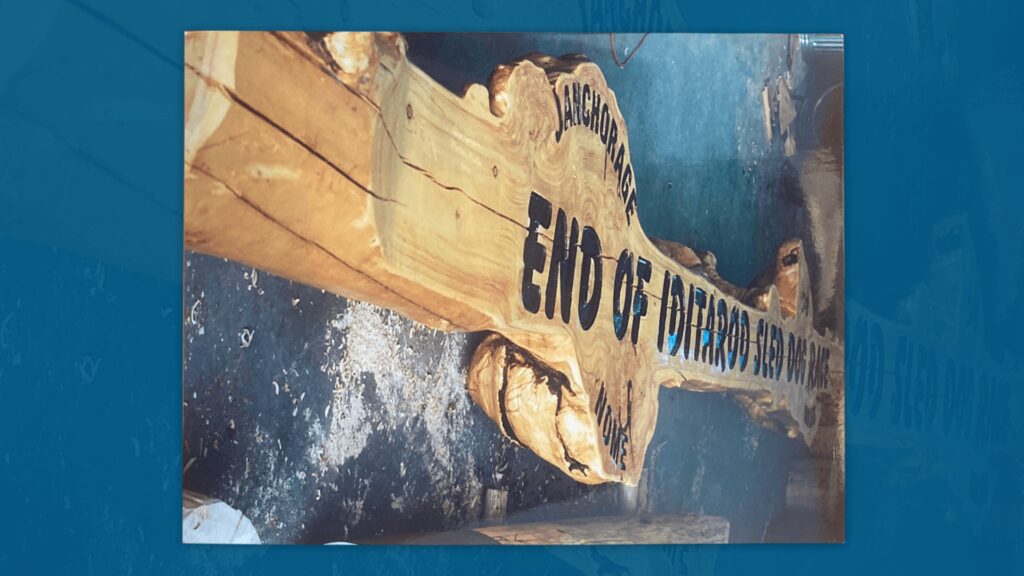At the Iditarod banquet in Nome Sunday night, mushers, race organizers, and fans celebrated the latest running of the Last Great Race. And some mushers formally received prizes they had already earned along the trail, while others were honored with distinctions for dog care and sportsmanship.
The biggest payday goes to race champion Dallas Seavey, who took home a record $70,000 and a new pickup truck. His lead dog Reef also took home the Golden Harness award.
Nome’s Aaron Burmeister took home a slew of awards—including the Dorothy Page Halfway Award for being the first to the race’s Huslia midpoint; the Bristol Bay Native Corporation’s “Fish First” award as the first to Kaltag; and $3,500 in gold nuggets for being the “first to the coast” as the first musher into Unalakleet. He was also honored with the Herbie Nayokpuk award, given to the musher who best personifies the attitude of the “Shishmaref Cannonball” along the trail.
“Most improved musher” went to Travis Beals, who moved up an astonishing 26 places since his last race—moving up from 37th to 11th place this year. Norwegian rookie Thomas Waerner took home “rookie of the year” for finishing 17th.
Lance Mackey’s fellow mushers voted him this year’s Sportsmanship Award, in no small part due to his impressive efforts in rescuing fellow musher Scott Janssen’s team off the ice outside Koyuk. Mackey receives $3,500 and a commemorative trophy. Even before he knew he had won the award, Mackey recalled a frantic search for Janssen—who had been taken into the checkpoint by snowmachine earlier—before deciding he had to take the loose team in.
Lance Mackey recalled his story in an interview at the KNOM station.
The Mushers’ Choice Award, presented to the musher whom others in the race viewed as “most inspirational,” went to Lance’s brother Jason Mackey, who helped his brother along the trail from Tanana to Nome when frostbite and other health concerns threw his brother’s race into jeopardy.
The younger Mackey was brief with thanks at the podium, he said simply: “Always know, bro, I’m there for ya.” He takes home a gold Iditarod coin and plaque valued at nearly $4,000.
The Leonard Seppala Humanitarian Award—given to a musher by race veterinarians for outstanding dog care—went to Girdwood musher Nicolai Petit.
And while some mushers raked in big paydays or special honors, many of the race’s 66 finishers took home a humble belt buckle and a check for $1,049. For Kotzebue musher Chuck Schaeffer, that was more than enough.
“This is the end, this is it!” he chuckled happily, “no more racing for Chuck Schaeffer, man!”
Schaeffer first ran the Iditarod in 1985, but scratched out of that race. He tried again five years later, in 1990, only to scratch again. This year, at the age of 60, he made it to the Nome finish with seven dogs—half his starting team of 14—and for the lifelong musher, that was all the reward he needs.
“It’s something I get to cross off my bucket list … I don’t have to do this any more, I’m not married to the Iditarod. It’s all good, it’s all over, it’s all done,” he said at the banquet. “My end priority was to get to Nome. And we accomplished that, and I think that was a big accomplishment for me.”
Beyond the mushers, the banquet celebrated the entire race—and one checkpoint in particular. This year’s “Golden Clipboard” award for the most outstanding checkpoint went to Huslia—the interior community known for its deep roots to the sport that was for, the first time in the race’s history, an official checkpoint along the trail.







